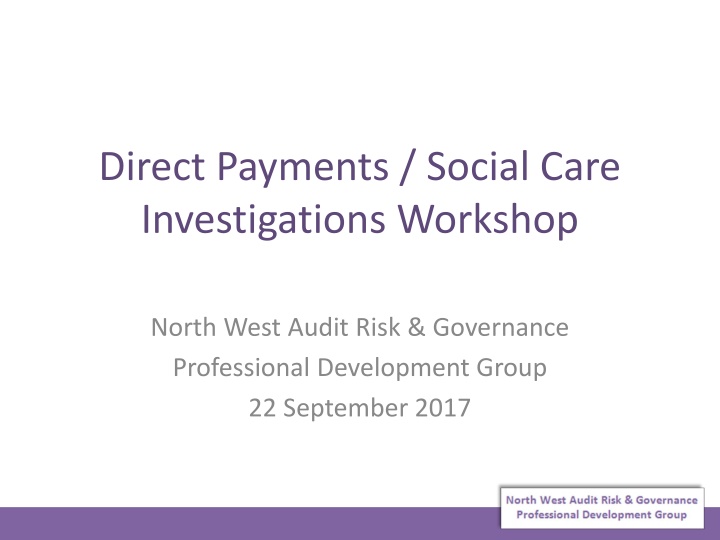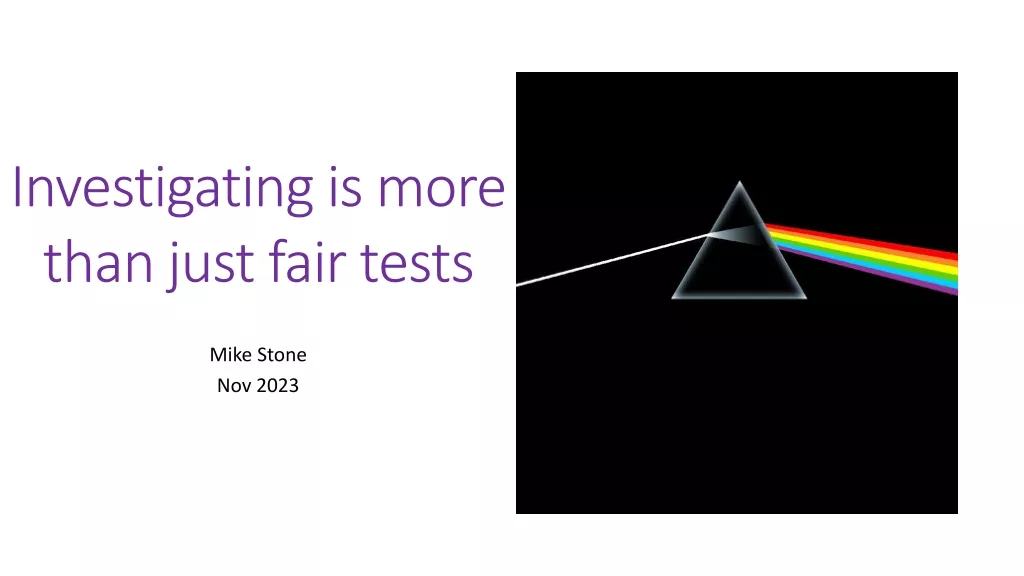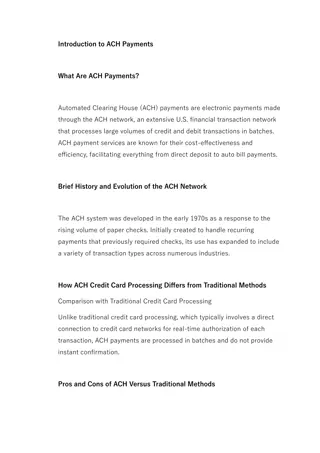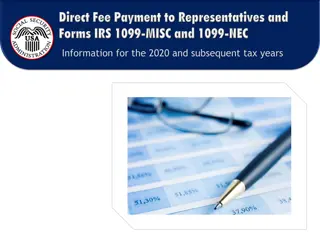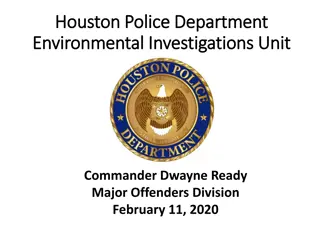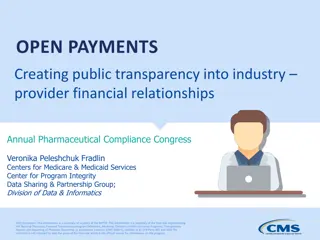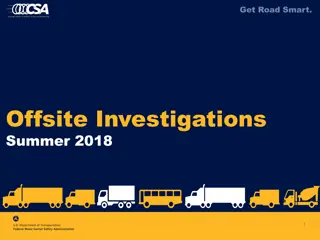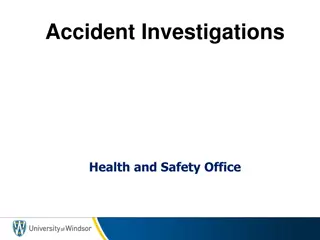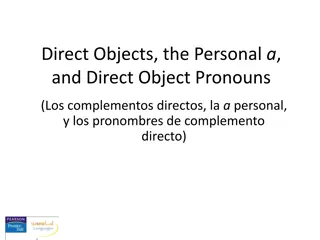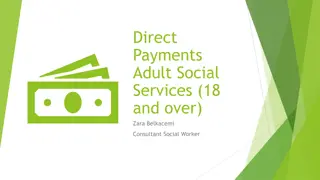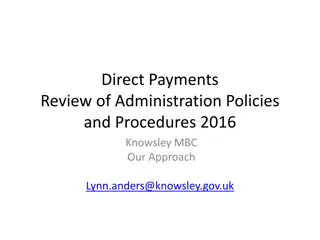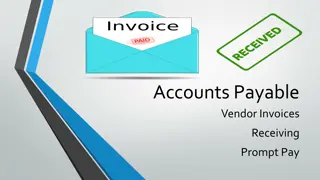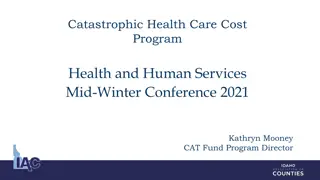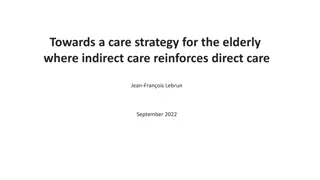Direct Payments & Social Care Investigations Workshop Overview
Explore the key areas covered in the Direct Payments & Social Care Investigations Workshop, focusing on Direct Payments, social care fraud, applications, counter-fraud work, investigations, and overcoming cultural resistance. Delve into the risks associated with social care fraud and learn about the significant impact it has on resources. Gain insights from a seasoned Internal Audit professional with extensive experience in counter-fraud initiatives across Warrington and Salford. Discover the prevalence of social care fraud and the various risks it poses to the public purse.
Download Presentation

Please find below an Image/Link to download the presentation.
The content on the website is provided AS IS for your information and personal use only. It may not be sold, licensed, or shared on other websites without obtaining consent from the author.If you encounter any issues during the download, it is possible that the publisher has removed the file from their server.
You are allowed to download the files provided on this website for personal or commercial use, subject to the condition that they are used lawfully. All files are the property of their respective owners.
The content on the website is provided AS IS for your information and personal use only. It may not be sold, licensed, or shared on other websites without obtaining consent from the author.
E N D
Presentation Transcript
Direct Payments / Social Care Investigations Workshop North West Audit Risk & Governance Professional Development Group 22 September 2017
Welcome! What are we going to cover today: Mainly Direct Payments, but also some issues relating to other social care investigations A service user s experience of the Direct Payments regime DP / social care fraud in context Applications, assessments and referrals Proactive counter fraud work Investigating cases Options for prosecution / recovery of monies Overcoming cultural resistance
Welcome! Some important things about today: This is your workshop I m just the facilitator! This is an opportunity for us all to share our experiences, successes and problems Some attendees have lots of experience in this area, others have little there s no such thing as a daft question! Chatham House rules will apply I m going to use your input from the pre-workshop questionnaire We will collate all contributions, ideas and best practice during the session and feed this back to you
Welcome! About me: 22 years in Internal Audit Managed Counter Fraud Team across Warrington and Salford since 2015 Member of the Fighting Fraud and Corruption Locally Oversight Board Member of the Core Group for the Local Government Counter Fraud Standards project Member of TISOnline Editorial Board for Internal Audit On Shortlisting Panel for Government Counter Fraud Awards
Some context How big a problem is DP / social care fraud? CIPFA CFaCT 2016 352 reported cases of social care fraud, ave. value 9-10k Represented 0.4% of total cases (by number) but considered one of the biggest emerging fraud risk areas Protecting the English Public Purse has DP fraud as one of their Other types of fraud no mention of other social care fraud. But also: NHS Safeguarding Adults 2016 report states that 17% of section 42 Care Act referrals in 2015-16 were for financial / material risks (c.22,000 referrals). The source of risk was either the social / care worker (19%) or another person known to the individual (63%) Action on Elder Abuse report that financial abuse is a significant problem, often perpetrated by family members
So what are the risks? Resources wasted (e.g. on paying for services not needed, investigating cases) Council bills not paid (contributions to care) Users don t get the service they need Increased safeguarding risk (not just financial) Reputational risk Self funders may fall into requiring LA support BUT Are these risks recognised anywhere? Do you have a fraud risk register? Have you tried to quantify the potential loss? Do you have resources allocated to addressing this risk?
Is it just fraud? Do you look at fraud, error and debt holistically? Fraudulent activity may give rise to debt Poorly designed controls and data capture can increase the risk of fraud as well as error Social care debt is often a significant proportion of a council s debt portfolio The involvement of IA / counter fraud teams in debt recovery may help prevent further formal action Do you work with social care / financial assessment / income recovery teams to identify opportunities for joint working?
What are the barriers to investigation? Lack of resources to investigate (IA / dedicated resource) Not seen as a priority risk area Reductions in DP Team resource affects monitoring and review, identifying changes in circumstances Lack of knowledge in area (audit/fraud and social workers/DP Team) Care Act restrictions - focus on care provision and meeting needs rather than finance / bureaucracy Lack of statutory powers to require information (e.g. bank accounts) Difficulty getting information from 3rdparties Lack of referrals reluctance of social care staff to refer leads to difficulty in identifying cases to investigate Issues with DWP working availability of ILF paperwork Lack of established procedures to work with external parties Reluctance of OPG to take action
Applications and Assessments The first line of defence against fraud. Some questions to ask: Do application forms require applicants to positively provide information, e.g. a specific amount of capital, rather than just asking if they have less than the limit? For any closed questions, does the applicant have to write Yes or No rather than just ticking a box? Do you require applicants with benefits in payment to provide the information again, rather than just passporting them? Do application forms require information that could lead to ineligibility, e.g. for DP, sentencing in relation to drug / alcohol dependency Do forms state that providing false information may be a criminal offence, and that applicants may be required to return monies spent on ineligible items? Do the forms state that the information provided may be used for data matching to identify and prevent fraud? Are applicants required to provide original documentation, e.g. bank statements, proof of identity? If a suitable person is appointed, are they required to sign that they are aware of their responsibilities?
Care planning Is the care plan clear about what the DP is to be used for: Personal or domiciliary care or respite care Equipment needed for independent living Employing someone to provide support Activities that promote their wellbeing Is the plan clear about the accounting and reporting requirements, e.g. provision of monthly returns? Has the user been told that, if they employ someone, they are classed as an employer and are responsible for tax, NI, pension contributions? Are there third parties available to provide these payroll services? Are these vetted? Does the plan provide for any variations in provision, e.g. if PA is sick / on leave, hospital stays, temporary variations in need? Is it made clear that capital can only be built up for the purchase of an item, or other payment, specified in the care plan? Are any other conditions made clear, e.g. around the use of family members Is there an initial review date, then provision for regular review?
Group Exercise 1 Identify any other elements of good application and care planning processes in terms of the documentation and the checks carried out. Identify any weaknesses you have found in these processes that have increased the risk of fraud.
Monitoring Does your DP team carry out regular audits? Are they regularly checking: Whether the care needs are being met, or whether the care plan (and amount) needs reviewing How they are using the DP Which organisations and care providers they are using are these approved / appropriate Who is in control of the money are they spending it appropriately Have they experienced staffing cuts in recent years do they apply a risk- based approach to the audit programme? Is there a clear justification for any reduction in monitoring of accounts? Are excess balances identified and recovered? Are social workers aware of the circumstances that may give rise to fraud? What training have they received? Is there anything in their CPD programme?
Referrals Referrals: Do you have formal / informal referral processes in place to receive concerns arising from DP audits / s.42 referrals / income recovery ? Do you meet regularly with these staff to discuss concerns? Do you get involved in case conferences? Do you publicise whistleblowing as a route for raising concerns about social care matters have you made your referral routes available to staff working for your contracted providers? Proactive Work: Use of NFI Internal / External data matching, e.g. to identify multiple claims across authorities, PAs being employed by more than one user, deceased claimants, undeclared income / pensions
Referrals The results from the questionnaire (from 19 respondents) for sources of referrals: Direct Payments team 12 Social care staff 8 Financial Assessment team 7 AR / Income Recovery team 3 Whistleblower 6 Proactive work / data analytics 7
Group Exercise 2 Identify any good practice in generating referrals. How have you overcome cultural resistance / other barriers? What have been your best sources for referrals why are these sources better than others? Identify any proactive work you have undertaken what were the successes / problems? What other proactive work would you like to undertake what has stopped you from doing this?
The Investigation Process Before you investigate: Does your Anti-Fraud, Bribery and Corruption strategy give you the authority to investigate cases? Do you have a formal fraud response plan? Do you have suitably skilled / qualified / experienced staff? Who would get involved in these cases IA / Counter Fraud team? How is your resource identified for such work planned resource, contingency? Have you considered joint working with other authorities / agencies?
The Investigation Process What sort of cases might you be investigating? Can be broadly classed as: False claims or overstatement of needs Budget mismanagement (including inappropriate expenditure) Multiple claims across Authorities Posthumous continuation of claim.
The Investigation Process What initial evidence would you look to obtain?: DP signed agreement / contract Identify type of DP account managed, virtual, is a payment card used Other benefits claimed, inc ILF, and non-monetary benefits, e.g. Motability, Blue Badge Details of the client s residence, e.g. is it rented accommodation owned by an LA/RP? Details of the responsible person are they appointee? Details of PA where they live, are they claiming benefits / receiving care / support too Details of DP audits carried out Whether any safeguarding concerns have been raised on the client
The Investigation Process Potential investigation checks (1): Have DP audits been carried out on a regular basis have these identified any issues, e.g. significant balances, refusal to provide accounts / supporting documentation, appointments cancelled, relatives refusing to let staff see client. Have there been any safeguarding referrals of relevance, e.g. financial Credit check on client to identify any links to others, and anyone else linked to the property (also electoral roll) Further checks on the PA to establish their identity and any potential relationship to the client, e.g. via Credit checks / s.29 (3) requests (e.g. to police), open source information? Check PA timesheets for reasonableness what can you check these against (other payroll records?) S34 requests for publicly available information, e.g. Land Registry, Registrar s information
The Investigation Process Potential investigation checks (2): Checks on the client to establish entitlement (e.g. anything on social media that indicates overstatement of needs) / family relationships (with PA)? Companies House to check validity of companies paid by client / suitable person CQC checks? Checks on the supporting documentation from the client payslips, chequebooks, account statements NAFN checks on bank accounts identify owners, linked accounts Actions by investigator interviews (client, suitable person, appointee, social workers), surveillance
Group Exercise 3 Identify any other investigation checks that you could carry out / have carried out. Identify any issues that you have had with obtaining information how did you overcome them (if you didn t, what was the sticking point?) Identify any other checks you could have carried out, or information you could have obtained, that would have helped the investigation.
What might you find? (1) A DP investigation can unearth a number of activities: Fictitious carers set up with the payroll company used by the DP client. The bank account details on the carers new starter forms are the bank account number of the DP client or an associate. May use the identities of real people. Exaggerated hours for carers are phoned through to the payroll company: the DP client or appointee takes a top slice of the wage, or the client and PA split the difference. Payslips may reconcile against cheques debiting the bank account, however, those cheques may have been addressed to someone else, payee cash or used for purchases/funding lifestyle. Payslips tend to be handwritten often not completing all the necessary information (e.g. full name and address, NI Numbers, exact dates of payments) so difficult to establish if the carers are real people. The Direct Payment is used to pay family members for providing care / support where the LA has not deemed this to be necessary Doubtful Disability The DP client exaggerates their care needs or does not have any needs and falsely claims Direct Payments on application. N.B. there is an acknowledgement that some social workers may feel pressure to exaggerate needs in order to secure assistance for their client. The client finds that they need less care and support than assessed and fail to inform the LA that they are not procuring the assessed amount.
What might you find? (2) Counterfeit Documentation counterfeit bank statements and payslips are produced and sent to the LA for the DP audit. Bogus suppliers responsible person sets up bogus suppliers, with their own account, and creates fake invoices Misappropriation of DP Funds Money from the DP bank account is moved to another bank account of the DP client, the appointee, associate or relative and/or spent on lifestyle rather than care. Other social care investigations may find : Appointee / Deputy not paying client s contribution to care costs. May pay personal allowances, so user is not suffering detriment. Friend / relative / social worker stealing money from user / persuading them to withdraw money from their accounts. N.B. issue of a user s right to make bad decisions. Carer persuading user to name them in their will. Receiving payments after user has died (relative / care home).
Prosecution / Recovery Options (1) For DP cases, there are a number of persons you may wish to prosecute / recover money from: DP recipient Suitable Person Appointee Personal Assistant A number of options will be available: Prosecution by LA Prosecution by Police Referral to other bodies, e.g. DWP Invoice Civil action / PoCA Referral to the OPG as to concerns regarding a person with a responsibility such as PoA Application to the Court of Protection for a best interests order, deputyship, or ousting an attorney who is behaving badly
Prosecution / Recovery Options (2) For all social care cases, there are other issues to consider: Is your authority comfortable prosecuting service users? Are there issues around anti-poverty strategies? What are the sanction options if the fraud is being committed by a third party, e.g. a relative? Would you consider investigating cases where the authority is not directly suffering loss? Is there a desire to recover debt rather than prosecute?
Prosecution / Recovery Options The results from the questionnaire (from 19 respondents) for prosecution / recovery routes used: Prosecution Fraud Act 5 Prosecution Theft Act 3 Use of other legislation 3 Referral to other agency 7 Debt Recovery 12 Internal sanctions 7
To Conclude.. Back to the barriers Is there anything else you wanted from this workshop that we haven t covered? We will pull together the output from the day and circulate it to you. If there is anything we haven t found an answer for, we ll try and get it for you! Please see our website for details of further events: http://www.cipfa.org/members/regions/north-west/audit-risk-and-governance-group To go on the NWARGG Mailing list: http://cipfa.us14.list-manage.com/subscribe/post?u=9b944776c0c40a4b7674b20bb&id=eae2119f1c Useful Links: Care and support statutory guidance 2017: https://www.gov.uk/government/publications/care-act-statutory-guidance/care-and-support-statutory-guidance Care Act 2014: http://www.legislation.gov.uk/ukpga/2014/23/contents/enacted The Care and Support (Direct Payments) Regulations 2014: http://www.legislation.gov.uk/uksi/2014/2871/pdfs/uksi_20142871_en.pdf
Thank You! Thank you for your time and input. If you have any other questions, or anything to add, please contact: Simon Bleckly: sbleckly@warrington.gov.uk Mat Tanner: Mat.Tanner@trafford.gov.uk
